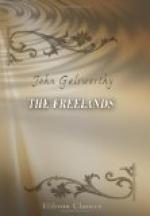Stormed by an attack of his cacoethes scribendi, after those few blank days at Becket, Felix saw nothing amiss with his young daughter. The great observer was not observant of things that other people observed. Neither he nor Flora, occupied with matters of more spiritual importance, could tell, offhand, for example, on which hand a wedding-ring was worn. They had talked enough of Becket and the Tods to produce the impression on Flora’s mind that one day or another two young people would arrive in her house on a visit; but she had begun a poem called ‘Dionysus at the Well,’ and Felix himself had plunged into a satiric allegory entitled ’The Last of the Laborers.’ Nedda, therefore, walked alone; but at her side went always an invisible companion. In that long, imaginary walking-out she gave her thoughts and the whole of her heart, and to be doing this never surprised her, who, before, had not given them whole to anything. A bee knows the first summer day and clings intoxicated to its flowers; so did Nedda know and cling. She wrote him two letters and he wrote her one. It was not poetry; indeed, it was almost all concerned with Wilmet Gaunt, asking Nedda to find a place in London where the girl could go; but it ended with the words:
“Your lover,
“Derek.”
This letter troubled Nedda. She would have taken it at once to Felix or to Flora if it had not been for the first words, “Dearest Nedda,” and those last three. Except her mother, she instinctively distrusted women in such a matter as that of Wilmet Gaunt, feeling they would want to know more than she could tell them, and not be too tolerant of what they heard. Casting about, at a loss, she thought suddenly of Mr. Cuthcott.
At dinner that day she fished round carefully. Felix spoke of him almost warmly. What Cuthcott could have been doing at Becket, of all places, he could not imagine—the last sort of man one expected to see there; a good fellow, rather desperate, perhaps, as men of his age were apt to get if they had too many women, or no woman, about them.
Which, said Nedda, had Mr. Cuthcott?
Oh! None. How had he struck Nedda? And Felix looked at his little daughter with a certain humble curiosity. He always felt that the young instinctively knew so much more than he did.
“I liked him awfully. He was like a dog.”
“Ah!” said Felix, “he is like a dog—very honest; he grins and runs about the city, and might be inclined to bay the moon.”
‘I don’t mind that,’ Nedda thought, ’so long as he’s not “superior."’
“He’s very human,” Felix added.
And having found out that he lived in Gray’s Inn, Nedda thought: ’I will; I’ll ask him.’
To put her project into execution, she wrote this note:
“Dear Mr. Cuthcott:
“You were so kind as to tell me you wouldn’t mind if I bothered you about things. I’ve got a very bothery thing to know what to do about, and I would be so glad of your advice. It so happens that I can’t ask my father and mother. I hope you won’t think me very horrible, wasting your time. And please say no, if you’d rather.




